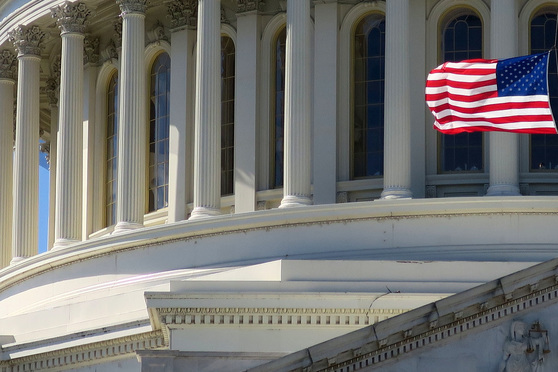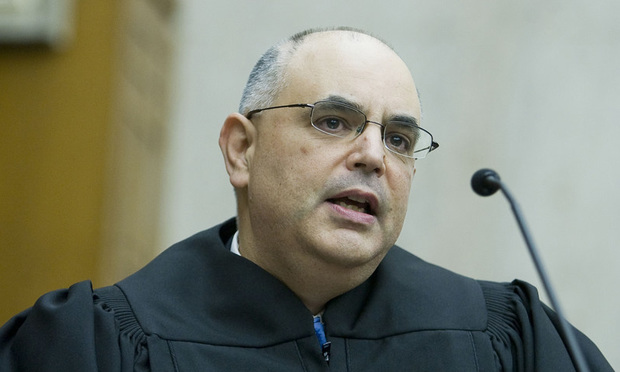DOJ Doesn't Deny Treasury's Russian 'Oligarch' List Was Copied From Forbes
Lawyers for a Moscow-born American businessman contend the designation, while not a formal sanction, has carried reputational consequences.
April 23, 2019 at 05:12 PM
4 minute read
 U.S. Capitol. Credit: Mike Scarcella/ NLJ
U.S. Capitol. Credit: Mike Scarcella/ NLJ
A U.S. Justice Department attorney did not dispute Tuesday that the Treasury Department based its list of designated Russian oligarchs on a lineup of billionaires that Forbes magazine published in 2017, as a federal judge heard arguments from a Moscow-born American businessman who says he should be removed from the roster of purported cronies of Vladimir Putin.
Lawyers for the businessman, Valentin Gapontsev, argued the Treasury Department included him on a list of Russian oligarchs without taking up a serious inquiry of whether he was, in fact, connected to Putin's regime. Instead, Gapontsev's attorneys said, the Treasury Department had effectively copied a Forbes list of wealthy Russians and tagged them as “oligarchs.”
Appearing before U.S. Judge Rudolph Contreras on Tuesday, Justice Department attorney Kevin Snell was asked whether it was true that the Treasury Department had simply republished a Forbes list titled “Billionaires: The Richest People in the World.”
“We're not challenging that assertion,” Snell responded. “For the purposes of today, it is accurate.”
Gapontsev and his company, IPG Photonics, a Massachusetts-based manufacturer of specialized lasers, filed a lawsuit in December challenging his identification as a Russian oligarch.
Gapontsev's team at Norton Rose Fulbright contends the designation, while not a formal sanction, has carried reputational consequences that complicate relationships with financial institutions and customers. At least one customer assumed his company was effectively disqualified from doing business in the United States, the lawsuit said.
On Tuesday, Norton Rose Fulbright partner Michael Edney touted Gapontsev's ties to the United States, describing him as a longtime U.S. citizen and Massachusetts resident whose wealth was derived from IPG Photonics and not from the Russian government. Gapontsev, he said, had only met Putin once.
Edney said the company was suffering a “profound injury” and that Gapontsev's labeling as a Russian oligarch was “no less injurious than being associated with the Soviet government in the 1950s.”
“This was a judgment outsourced to Forbes,” Edney said. “It wasn't made by the secretary.”
 U.S. District Judge Rudolph Contreras. Credit: Diego M. Radzinschi/ NLJ
U.S. District Judge Rudolph Contreras. Credit: Diego M. Radzinschi/ NLJContreras appeared to nudge Gapontsev and Treasury Department to reach a resolution out of court, asking both sides about the progress of their negotiations. Edney, declining to detail their discussions, said he was “optimistic.”
Contreras said he found it “mystifying” that President Donald Trump had not stepped in, noting his affinity for picking up the phone to save manufacturing jobs.
Congress ordered the Treasury Department to draft the oligarchs list under the Countering America's Adversaries Through Sanctions, a law against Russia, Iran and North Korea that Trump signed in August 2017 but criticized as “seriously flawed.” The law required the Treasury Department to identify individuals as “oligarchs in the Russian Federation, as determined by their closeness to the Russian regime.”
On Tuesday, Snell made a variety of arguments in defense of the Treasury Department's list. He stressed that the Treasury Department had not sanctioned Gapontsev but rather included him in an informational report to Congress. It was “up to Congress,” he said, to decide whether the Treasury Department adhered to the law in compiling the list of Russian oligarchs.
A Treasury representative told Forbes last year: “There is not a statutory or regulatory definition of oligarch, so Treasury included the $1 billion threshold as a reasonable number, which is similar to criteria contained in the U.S. Forbes list.”
Snell added that the term “oligarch” was not defined under the statute and that the Gapontsev's claim of irreparable harm was based on “supposition and speculation.”
“You have a number of good legal arguments,” Contreras said. “I don't know where the equities fall though.” The judge said he would rule in a “few weeks” on Gapontsev's request that he be removed from the oligarchs list.
Read more:
Ex-OFAC Director Jumps to Morrison & Foerster
Russian Billionaire Deripaska Sues Mnuchin Over 'Devastating' Sanctions
Treasury's 'Russian Oligarch' Label Was Lifted From Forbes Report, Suit Claims
What New Russia Trade Sanctions Mean for US Companies and Investors
This content has been archived. It is available through our partners, LexisNexis® and Bloomberg Law.
To view this content, please continue to their sites.
Not a Lexis Subscriber?
Subscribe Now
Not a Bloomberg Law Subscriber?
Subscribe Now
NOT FOR REPRINT
© 2025 ALM Global, LLC, All Rights Reserved. Request academic re-use from www.copyright.com. All other uses, submit a request to [email protected]. For more information visit Asset & Logo Licensing.
You Might Like
View All
RFK Jr. Will Keep Affiliations With Morgan & Morgan, Other Law Firms If Confirmed to DHHS
3 minute read
Read the Document: DOJ Releases Ex-Special Counsel's Report Explaining Trump Prosecutions
3 minute read
3rd Circuit Nominee Mangi Sees 'No Pathway to Confirmation,' Derides 'Organized Smear Campaign'
4 minute read
Judge Grants Special Counsel's Motion, Dismisses Criminal Case Against Trump Without Prejudice
Trending Stories
- 1Attorneys ‘On the Move’: O’Melveny Hires Former NBA Vice President; MoFo Adds Venture Capital Partner
- 2'Skin in the Game': Lawyers Call for Pressure After American Airlines Crash
- 3Apple Files Appeal to DC Circuit Aiming to Intervene in Google Search Monopoly Case
- 4A Plan Is Brewing to Limit Big-Dollar Suits in Georgia—and Lawyers Have Mixed Feelings
- 5Startup Bringing AI to Doctors' Offices Hires First GC
Who Got The Work
J. Brugh Lower of Gibbons has entered an appearance for industrial equipment supplier Devco Corporation in a pending trademark infringement lawsuit. The suit, accusing the defendant of selling knock-off Graco products, was filed Dec. 18 in New Jersey District Court by Rivkin Radler on behalf of Graco Inc. and Graco Minnesota. The case, assigned to U.S. District Judge Zahid N. Quraishi, is 3:24-cv-11294, Graco Inc. et al v. Devco Corporation.
Who Got The Work
Rebecca Maller-Stein and Kent A. Yalowitz of Arnold & Porter Kaye Scholer have entered their appearances for Hanaco Venture Capital and its executives, Lior Prosor and David Frankel, in a pending securities lawsuit. The action, filed on Dec. 24 in New York Southern District Court by Zell, Aron & Co. on behalf of Goldeneye Advisors, accuses the defendants of negligently and fraudulently managing the plaintiff's $1 million investment. The case, assigned to U.S. District Judge Vernon S. Broderick, is 1:24-cv-09918, Goldeneye Advisors, LLC v. Hanaco Venture Capital, Ltd. et al.
Who Got The Work
Attorneys from A&O Shearman has stepped in as defense counsel for Toronto-Dominion Bank and other defendants in a pending securities class action. The suit, filed Dec. 11 in New York Southern District Court by Bleichmar Fonti & Auld, accuses the defendants of concealing the bank's 'pervasive' deficiencies in regards to its compliance with the Bank Secrecy Act and the quality of its anti-money laundering controls. The case, assigned to U.S. District Judge Arun Subramanian, is 1:24-cv-09445, Gonzalez v. The Toronto-Dominion Bank et al.
Who Got The Work
Crown Castle International, a Pennsylvania company providing shared communications infrastructure, has turned to Luke D. Wolf of Gordon Rees Scully Mansukhani to fend off a pending breach-of-contract lawsuit. The court action, filed Nov. 25 in Michigan Eastern District Court by Hooper Hathaway PC on behalf of The Town Residences LLC, accuses Crown Castle of failing to transfer approximately $30,000 in utility payments from T-Mobile in breach of a roof-top lease and assignment agreement. The case, assigned to U.S. District Judge Susan K. Declercq, is 2:24-cv-13131, The Town Residences LLC v. T-Mobile US, Inc. et al.
Who Got The Work
Wilfred P. Coronato and Daniel M. Schwartz of McCarter & English have stepped in as defense counsel to Electrolux Home Products Inc. in a pending product liability lawsuit. The court action, filed Nov. 26 in New York Eastern District Court by Poulos Lopiccolo PC and Nagel Rice LLP on behalf of David Stern, alleges that the defendant's refrigerators’ drawers and shelving repeatedly break and fall apart within months after purchase. The case, assigned to U.S. District Judge Joan M. Azrack, is 2:24-cv-08204, Stern v. Electrolux Home Products, Inc.
Featured Firms
Law Offices of Gary Martin Hays & Associates, P.C.
(470) 294-1674
Law Offices of Mark E. Salomone
(857) 444-6468
Smith & Hassler
(713) 739-1250








